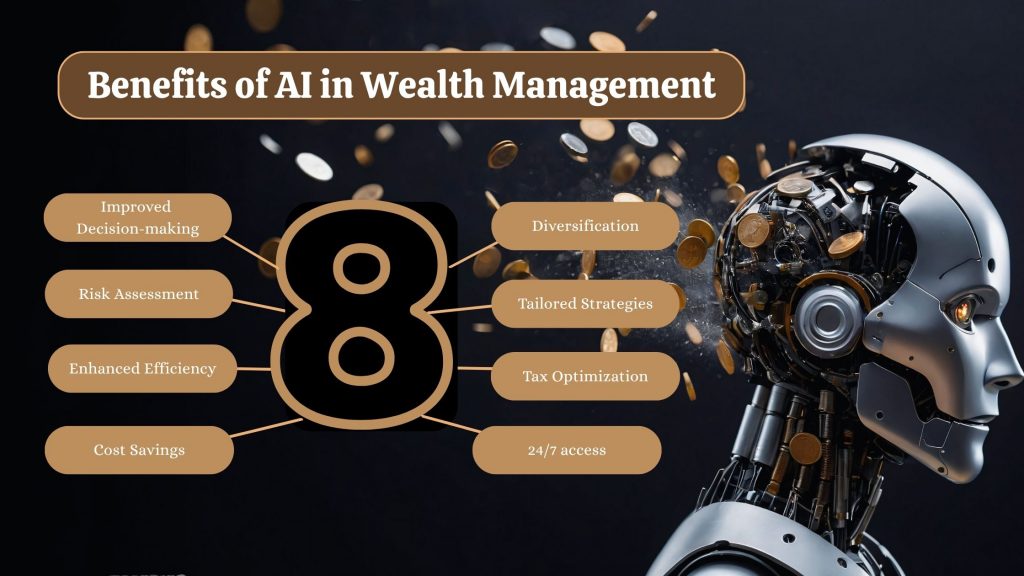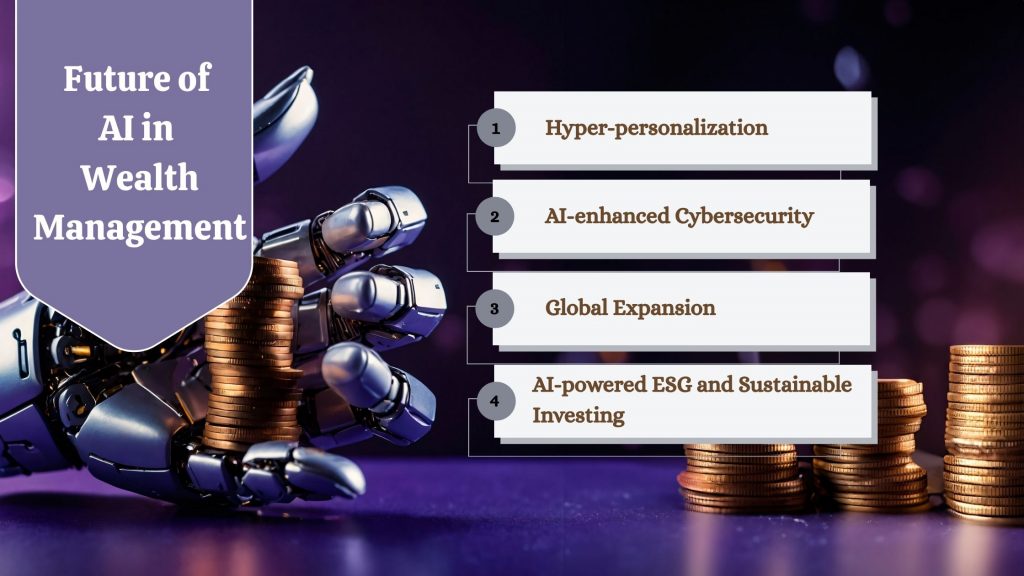
How AI in Wealth Management is Reshaping Financial Services

Blog Summary:
This blog explores how AI is transforming wealth management by enabling smarter, faster, and more personalized financial solutions. It highlights the key benefits, practical use cases, and challenges of integrating AI into investment strategies. Readers will also gain insights into how AI is reshaping advisor-client relationships and the future of digital wealth management.
The financial industry has always embraced technology to enhance efficiency, but AI in Wealth Management is taking this evolution to an entirely new level. With the rise of data-driven decision-making, wealth management firms are integrating artificial intelligence into their core services to offer clients smarter, faster, and more personalized financial solutions. According to McKinsey experts, AI is set to add USD 1.2 trillion to the finance sector by 2030.
Traditionally, wealth management depended heavily on human advisors and manual processes to manage portfolios, assess risks, and tailor investment strategies. However, in today’s digital-first environment, the explosion of big data and machine learning capabilities has paved the way for wealth management AI—a suite of intelligent systems capable of analyzing vast amounts of financial data in real-time.
The adoption of AI is not just a trend; it’s a necessity. Investors today expect more than just portfolio oversight—they seek predictive insights, real-time recommendations, and seamless digital experiences.
AI enables financial firms to meet these expectations by automating tasks, improving decision-making, and offering wealth management AI solutions that can continuously learn and adapt to market changes.
More than just a technological upgrade, AI is redefining the advisor-client relationship. It provides wealth managers with tools to offer hyper-personalized services and uncover investment opportunities that may be overlooked by traditional methods.
Whether it’s helping high-net-worth individuals optimize taxes or giving young investors access to robo-advisory platforms, automation in wealth management is reshaping how value is delivered.
In the sections that follow, we’ll explore how AI works in the context of wealth management, examine its benefits and real-world use cases, discuss implementation challenges, and envision the future of this rapidly transforming domain.
How Does AI for Wealth Management Work?
AI in Wealth Management functions through a blend of advanced technologies like machine learning, natural language processing (NLP), predictive analytics, and big data. These tools analyze complex financial datasets, identify patterns, and deliver actionable insights that enhance decision-making and automate repetitive processes.
At the core of wealth management AI solutions lies data—structured and unstructured. AI algorithms are trained to digest massive volumes of information, including historical market data, client profiles, economic indicators, and even social sentiment. This enables AI systems to forecast market movements, evaluate asset risks, and recommend tailored investment strategies for each client.
Machine learning models continuously evolve as they interact with new data, learning from both successful and failed predictions. Over time, this dynamic learning process improves the system’s accuracy and reliability.
For instance, an AI engine may begin by analyzing a client’s risk appetite, investment goals, and past behavior to recommend a diversified portfolio. As market conditions shift or client preferences change, the system adapts—offering updated advice that aligns with real-time needs.
Natural language processing, another key component, helps AI platforms understand and respond to customer queries. This is the foundation of intelligent chatbots and voice assistants that provide 24/7 client support, simplifying communication and increasing accessibility.
Additionally, automation in wealth management enables firms to streamline back-office operations, from onboarding and compliance checks to real-time reporting and transaction execution. This not only reduces human error but also frees up financial advisors to focus on strategic client relationships.
By integrating AI into their technology stacks, firms are now equipped to handle large and diverse client bases while maintaining personalized attention—something that was difficult to achieve with traditional systems alone.
Ready to Unlock the Power of AI in Wealth Management?
Enhance portfolio strategies, streamline client interactions, and drive smarter financial decisions with AI technology.
Benefits of AI in Wealth Management

The adoption of AI in Wealth Management is yielding measurable benefits across the industry. AI-powered platforms have demonstrated up to a 30% increase in operational efficiency. These figures highlight the growing trust in wealth management AI solutions as a long-term strategic asset.
Here’s a closer look at the core advantages:
Improved Decision-making
AI enhances the ability of advisors and firms to make informed investment decisions by leveraging data analytics. It processes complex market signals, historical trends, and economic indicators to offer suggestions that are both timely and well-informed.
Risk Assessment
AI helps identify potential investment risks by analyzing data patterns and predicting unfavorable market conditions. It adjusts recommendations dynamically, helping advisors safeguard portfolios with real-time risk mitigation strategies.
Enhanced Efficiency
Manual processes in wealth management—like data entry, compliance checks, and transaction recording—are time-consuming. AI automates these tasks, reducing human error and freeing up professionals to focus on client-centric activities.
Cost Savings
By automating labor-intensive tasks and streamlining workflows, AI reduces the overhead costs associated with portfolio management and advisory services. These savings can be passed on to clients in the form of better rates or reinvested into innovation.
Diversification
AI platforms can scan a broader array of assets and investment types than human advisors, facilitating portfolio diversification that aligns with the investor’s goals, risk tolerance, and market conditions.
Tailored Strategies
Personalization is where AI in Wealth Management truly shines. AI analyzes client behavior, income patterns, life events, and financial goals to develop customized strategies that evolve alongside the client’s financial journey.
Tax Optimization
AI tools evaluate the tax impact of each investment decision and suggest ways to minimize liabilities. From identifying tax-loss harvesting opportunities to recommending better asset locations, AI simplifies complex tax strategies.
24/7 Access
With the rise of AI-driven chatbots and virtual assistants, clients no longer need to wait for business hours to get support. These tools provide instant responses to queries, update portfolio information, and even guide clients through financial decisions anytime, anywhere.
Use Cases of AI in Wealth Management

The real strength of AI in Wealth Management lies in its practical applications across various processes. From portfolio handling to client service, wealth management AI solutions are reshaping the way firms operate and deliver value. Here are some of the most impactful use cases:
Portfolio Management
AI-driven systems analyze market data, client preferences, and risk profiles to recommend and manage investment portfolios. These tools continuously learn from new data, allowing real-time rebalancing and dynamic allocation strategies. This ensures portfolios remain aligned with the client’s goals—even in volatile markets.
Risk Assessment
AI enhances risk modeling by evaluating both structured and unstructured data, including market sentiment and global news. By identifying hidden correlations and early warning signs, it helps advisors create more resilient investment strategies and preempt market downturns.
Tax Planning
Wealth managers use AI to map out tax-saving strategies tailored to each client’s income, investments, and jurisdiction. The system can suggest optimal times to sell assets, implement tax-loss harvesting, or shift between taxable and tax-deferred accounts.
Complex Tax Calculations
AI simplifies the notoriously complicated tax codes and calculations involved in wealth management. It can automatically update itself with new regulations and apply them to a client’s financial data, reducing errors and ensuring compliance.
Intelligent Robo-Advisors
Robo-advisors are one of the most well-known AI in wealth management examples. These platforms provide low-cost, automated financial advice and investment management.
Robotics AI makes them smarter—capable of customizing investment plans, predicting life-stage needs, and offering goal-based investing without human intervention.
Streamlining Client Onboarding
Traditional onboarding is slow and paperwork-heavy. AI accelerates the process by using optical character recognition (OCR), identity verification tools, and automated compliance checks. This not only reduces time but also improves accuracy and client experience.
Simplified Advisory Services
With the help of natural language processing (NLP), AI can understand client queries and preferences through voice or text, delivering simplified advice in a human-like manner. This allows financial firms to offer advisory services at scale, even to smaller accounts that were once underserved.
Blockchain and Smart Contracts
Although not AI-exclusive, when paired with AI and blockchain, this technology allows for secure, transparent, and automated contract execution. Smart contracts can trigger asset transfers, payouts, or other financial actions based on pre-set AI-detected conditions or milestones.
Sentiment Analysis for Market Insights
AI tools can scan social media, financial news, and analyst reports to extract investor sentiment. This helps firms detect early signs of market shifts or public reactions that may influence asset performance—adding another layer of intelligence to investment strategies.
Chatbots
AI-powered lead chatbots are transforming client interaction by offering instant assistance, answering queries, providing portfolio updates, and even nudging clients about important financial decisions. This improves engagement and reduces dependency on human advisors for routine tasks.
Ready for AI-Powered Wealth Management?
BigDataCentric delivers advanced AI solutions to enhance financial performance.
AI in Wealth Management: Key Challenges & Solutions
While the potential of AI in Wealth Management is enormous, implementation doesn’t come without hurdles. Financial institutions often face technical, regulatory, and operational barriers when integrating AI.
Understanding these challenges—and the strategies to overcome them—is crucial to unlock the full potential of wealth management AI solutions.
Data Privacy & Security
Challenge: Wealth management deals with highly sensitive financial and personal client data. AI systems rely on accessing and processing this data, raising concerns around cybersecurity, unauthorized access, and data breaches.
Solution: Firms must enforce end-to-end encryption, strict access control, and real-time monitoring. Leveraging AI itself for threat detection—through anomaly detection and behavioral analytics—can create a proactive defense system. Adopting privacy-by-design principles is also essential to ensure data is protected at every level.
Data Quality Issues
Challenge: AI systems are only as good as the data fed into them. Poor data quality—such as outdated, incomplete, or inconsistent records—can lead to flawed outputs and poor decision-making.
Solution: Financial firms must invest in data governance frameworks that ensure accuracy, consistency, and completeness. Regular audits, real-time data validation, and integration of structured and unstructured data sources can drastically improve AI reliability.
High Implementation Costs
Challenge: Deploying AI-powered platforms—especially those that offer advanced capabilities—can be expensive. Smaller firms may struggle to justify the upfront costs, infrastructure requirements, and skilled talent needed for successful AI integration.
Solution: Cloud-based AI solutions, open-source platforms, and scalable AI-as-a-service models can significantly lower entry barriers. Collaborations with fintech firms or outsourcing specific functions can also reduce operational burdens while ensuring access to advanced technologies.
Regulatory Compliance
Challenge: The financial services sector is subject to strict regulatory oversight. Using AI for investment decisions, client interactions, or compliance checks must align with regional and international financial laws, which are still evolving with regard to AI.
Solution: Firms must work closely with legal teams and regulators to ensure their AI models remain compliant. Implementing explainable AI (XAI) frameworks and maintaining audit trails can provide transparency and support regulatory reporting requirements.
Lack of Transparency
Challenge: Many AI models, especially those based on deep learning, are often criticized for being “black boxes”—offering no clear explanation for their decisions. This lack of interpretability erodes trust among both advisors and clients.
Solution: Financial institutions should focus on building explainable models that provide clear reasoning behind recommendations or decisions. Visual dashboards, model summaries, and user-friendly explanations can help demystify how the AI reaches certain conclusions, thereby increasing adoption and trust.
Why Choose BigDataCentric AI Development Services for Wealth Management
At BigDataCentric, we bring extensive expertise in both AI and financial technologies, ensuring that we can develop bespoke solutions that precisely meet the unique needs of your wealth management firm. Our AI-driven solutions are designed to streamline processes like portfolio management, client onboarding, and risk assessment, while improving decision-making and operational efficiency.
With a deep understanding of both AI capabilities and the intricacies of the financial industry, we can create powerful systems that enhance client experiences, drive better outcomes, and help your firm stay ahead of market trends.
We offer scalable and secure AI solutions, tailored to your specific goals and business model. From advanced data analytics to intelligent robo-advisors, our services can be customized to address your particular challenges.
At BigDataCentric, we ensure your solutions are not only effective but also comply with the highest standards of data security and regulatory requirements. Our goal is to help you optimize workflows, enhance personalization, and unlock the full potential of AI to deliver smarter, more profitable financial strategies for your clients.
The Future of AI in Wealth Management

The future of AI in Wealth Management is set to revolutionize the industry by enabling more personalized, secure, and scalable financial services. As AI continues to evolve, it will empower wealth managers to deliver tailored strategies, enhance client trust, and drive greater efficiency in their operations. Below are the key areas where AI will shape the future of wealth management:
Hyper-personalization
AI will further enhance hyper-personalization by analyzing vast amounts of client data to create highly individualized financial plans. This will allow wealth managers to offer more precise advice, product recommendations, and portfolio adjustments tailored to each client’s unique needs, preferences, and financial goals.
AI-enhanced Cybersecurity
As wealth management firms increasingly handle sensitive client information, AI-enhanced cybersecurity will become essential for maintaining trust and protecting against data breaches. AI will leverage advanced threat detection algorithms to safeguard client data and ensure firms remain compliant with security standards.
Global Expansion
AI will facilitate the global expansion of wealth management services by enabling firms to provide personalized financial strategies across borders. AI-driven tools will help wealth managers understand diverse market conditions, cultural differences, and regulations, ensuring a consistent and high-quality client experience worldwide.
AI-powered ESG and Sustainable Investing
AI will play a critical role in AI-powered ESG and sustainable investing by analyzing large datasets on environmental, social, and governance factors. Wealth managers will be able to offer clients ethically aligned investment options while ensuring profitable returns in the growing field of sustainable investments.
Want to Boost Your Wealth Management with AI?
BigDataCentric helps automate and optimize wealth management with cutting-edge AI.
A Bottom Line
The adoption of AI in Wealth Management marks a pivotal moment for the financial industry. As digital transformation accelerates, firms that invest in AI stand to gain a competitive advantage through streamlined operations, personalized experiences, and data-driven decision-making.
From intelligent robo-advisors and sentiment analysis to portfolio optimization and ESG-focused investing, AI is reshaping every layer of wealth management.
However, true success lies not just in implementing AI, but in leveraging it strategically — aligning technology with client needs and regulatory frameworks. Firms that strike this balance will lead the next generation of financial services.
FAQs
-
Can your AI solutions seamlessly work with current wealth management platforms?
Yes, our AI solutions are designed for smooth integration with existing wealth management systems. They support APIs and custom workflows, ensuring minimal disruption and faster deployment across platforms you already use.
-
What measures are in place to protect data privacy and security in your AI offerings?
We implement industry-standard encryption, role-based access, and regular security audits. Our AI solutions comply with global financial regulations, ensuring client data remains secure and confidential at all times.
-
How does AI support personalized wealth management services
AI analyzes client behavior, financial goals, and market trends to create tailored investment strategies—delivering a level of personalization that enhances client trust and retention.
-
How does AI process real-time financial market data efficiently?
AI leverages advanced machine learning models and streaming analytics to ingest, analyze, and react to real-time financial data. It identifies trends, detects anomalies, and triggers instant actions—enabling faster decision-making in volatile market conditions.

About Author
Jayanti Katariya is the CEO of BigDataCentric, a leading provider of AI, machine learning, data science, and business intelligence solutions. With 18+ years of industry experience, he has been at the forefront of helping businesses unlock growth through data-driven insights. Passionate about developing creative technology solutions from a young age, he pursued an engineering degree to further this interest. Under his leadership, BigDataCentric delivers tailored AI and analytics solutions to optimize business processes. His expertise drives innovation in data science, enabling organizations to make smarter, data-backed decisions.
Table of Contents
ToggleHere's what you will get after submitting your project details:
- A strict non-disclosure policy.
- Get in discuss with our experts.
- Get a free consultation.
- Turn your idea into an exceptional app.
- Suggestions on revenue models & planning.
- No obligation proposal.
- Action plan to start your project.
- We respond to you within 8 hours.
- Detailed articulate email updates within 24 hours.
Our Offices
USA
500 N Michigan Avenue, #600,Chicago IL 60611




